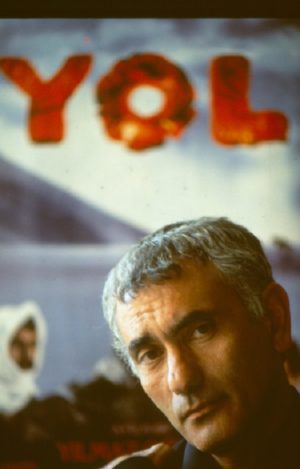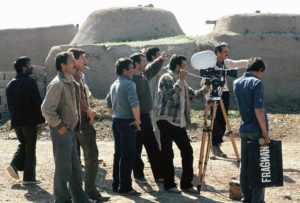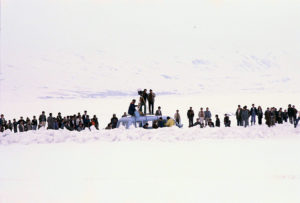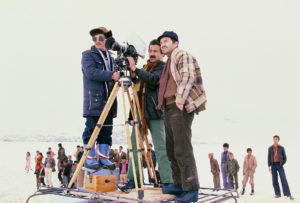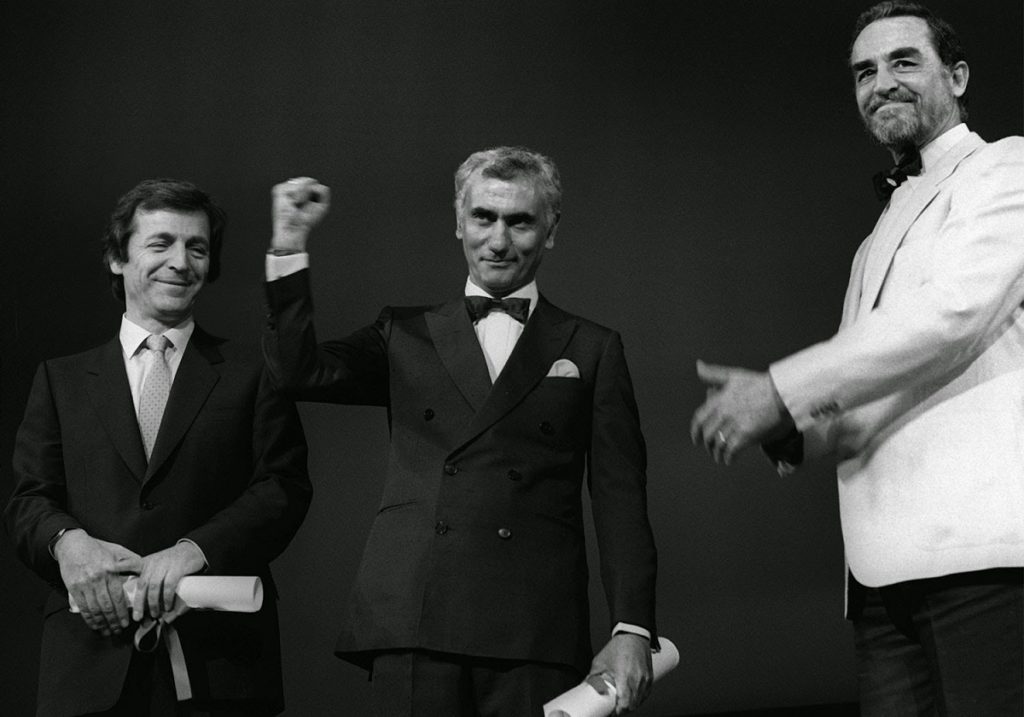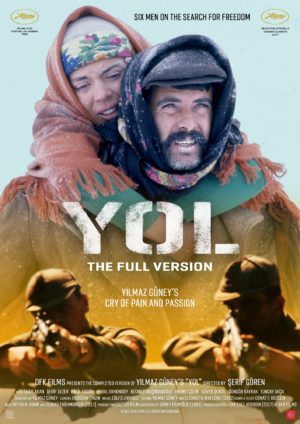 YOL – The Full Version (2017)
YOL – The Full Version (2017)
Yılmaz Güneys’ overpowering film about honour and passion, courage and pain, tenderness and cruelty – terror, anger, strength, love – and life. YOL has lost none of its relevance since the 1980’s.
The people portrayed in the film are Turkish and Kurdish, but such people are to be found wherever there is a struggle against oppression. They are all prisoners, some behind bars, many are prisoners of their own minds, but all are prisoners of the state.
In its depiction of the living conditions of six prisoners on home leave, YOL portrays an outline of the human landscape of Turkey. We experience how the people are oppressed, in particular, the Kurds and women. The patriarchal structure and its attitude to morality make up part of the repression.
The story is predominantly told through the fate of three prisoners, Seyit Ali, Mehmet Salih and Ömer. Three men who are torn from their daily lives. They had hoped that three days would suffice to forget the humiliation of everyday prison life and solve their most pressing issues at home. These shattered dreams make their crippling circumstances seem all the worse. So much for a glorious life of freedom! Ömer breaks out, Mehmet is shot and Seyit Ali remains a prisoner of his indecision. The struggle for a better life must continue and will last a long time…
Yılmaz Güney, Paris 1982
“The film YOL burst through Cannes like a hurricane. A film from exile that depicts the enslaved and degenerated homeland of the Turkish author and director Yılmaz Güney – this is not a beautifully presented cultural appetiser, but a passionate outcry.”
Martin Schaub, 17.05.1982
After 35 years, fresh on the screen
To celebrate the 80th birthday of Yılmaz Güney dfk*films restored this masterpiece of Turkish-Kurdish film history, supplementing it with film material that was thought to have been lost. 35 years after winning the Golden Palm we brought it back to the Cannes Film Festival and cinemas under the title “YOL – The Full Version”.
“YOL – The Full Version” (2017) honours what the great Turkish-Kurdish actor, author, director and producer Yılmaz Güney could not complete during his lifetime. The restored and completed version brings the content of the script, written by Güney in prison, to the screen.
Difficult work conditions
Yılmaz Güney wrote the script for the film YOL, which continues to exert an influence today, from prison – under the working title BAYRAM. In “YOL – The Full Version”, remaining faithful to Güney’s original script, six (instead of only five) Turkish and Kurdish prisoners are portrayed during the days of the religious holiday Bayram. Each one is trying to set his life in order during a week of prison leave.
Güney was in prison during the shooting of the film but was sometimes in contact via telephone with those on set, with director Şerif Gören in particular.
In October 1981, Yılmaz Güney successfully escaped from jail in Isparta and left totalitarian Turkey. Under difficult circumstances, he completed the rough draft of YOL in French asylum. Shortly before the premiere in Cannes, festival director Gilles Jacob demanded, with little justification, that the film should be no longer than 110 minutes due to his program structure. To stay in the world’s most important film festival’s competition programme, the existing 135-minute version had to be edited radically and briskly. Therefore an unfinished version of the film was shown in Cannes in 1982. Nevertheless, the Swiss production YOL was the first Turkish-Kurdish film to win the Golden Palm. The Swiss production company Cactus Film was running out of money and sold distribution licenses of this unfinished version to over 50 countries.
For more information: Why Yılmaz Güney‘s YOL had to be restored and completed
Pictures from the 1981 film shooting
- Shooting YOL 1981 | Kurdish village
- Shooting YOL 1981 | film crew in the snow
- YOL shooting 1981 | director of photography Erdoğan Engin | assistants Ali Şeker, Şeref Yılmaz
Finally complete!
The restored and completed “full-version” now respect the script, that Güney wrote in prison, in bringing the full story to cinema screens. Thanks to intensive research, film material that was thought to have been lost was found, digitised, and incorporated into the film in accordance with Yılmaz Güney’s original editing plan. The picture and sound were painstakingly renewed, enhanced and restored to their original condition.
For decades YOL has moved audiences all over the world. The unfinished version won the most coveted award, the Golden Palm at the 1982 Cannes film festival. One can watch the masterpiece of Turkish-Kurdish film history, complete and restored as “YOL – The Full Version”. This is a must-see for anyone who wants to understand Turks and Kurds – and you will learn a lot about yourself.
For further information
Yılmaz Güney: Script BAYRAM aka YOL | 1980 | English translation | 6 stories
Yılmaz Güney: Exposé | Storyline for the press in Cannes 1982 | German & Turkish | 6 stories
Yılmaz Güney | Elisabeth Waelchli: Editing plan 1982
A Swiss gets in touch with the Ugly King of Turkey – Donat Keusch meets the great artist Yılmaz Güney
Pressbook YOL – The Full Version
Jane Mills: introduces “YOL – The Full Version” at Cinema Reborn in Australia
Jane Mills: Program Notes YOL | Cinema Reborn
TRAILER
Interview
Donat F. Keusch
Cannes Filmfestival 2017
Awards 1982 for YOL
- Golden Palm Cannes Film Fest
- Prize of International Film Critics Association
- Special Mention of Oecumenical Jury Cannes Film Fest
- Award of French Syndicate of Film Critics
- Award of London Critics Circle
- Award of National Board of Review USA
- Nominated for Best Foreign Film at César Awards
- Nominated for Best Foreign Film at Golden Globe Awards
Credits YOL - The Full Version | CH 2017
a film by YILMAZ GÜNEY directed by ŞERİF GÖREN
Cast
- TARIK AKAN Seyit Ali
- HALİL ERGÜN Mehmet Salih
- NECMETTIN ÇOBANOĞLU Ömer
- HİKMET ÇELİK Mevlüt
- GÜVEN ŞENGİL Süleyman
- TUNCAY AKÇA Yusuf
- ŞERIF SEZER Zine
- MERAL ORHONSOY Emine
- SEVDA AKTOLGA Meral
- GÜNGÖR BAYRAK Nazife
- SEMRA UÇAR Gülbahar
- HALE AKINLI Seyran
- HİKMET TAŞDEMİR Sevket
- ENGIN ÇELIK Mirza
- ENVER GÜNEY Cinde
- TURGUT SAVAŞ Zafer
- ERDOĞAN SEREN Abdullah
- OSMAN BARDAKÇI Elim
- HASAN YİLDİZ Gardiyan
Crew
- dubbings 1982 ERDAL ÖZYAĞCILAR (Tarık Akan) / GÜLEN KARAMAN (Şerif Sezer) / ATİLLA YİĞİT / AKTAN DOĞRAR / RUTKAY AZİZ / BETÜL ARIM / MUHİTTİN AYAN
- YILMAZ GÜNEY loudspeaker / father at bus station / barber Elim and more
- additional dubbings 2017 AYSE DÜNDAR / GÖKMEN DÜNDAR / SEMRA KARTAL / TAMER YIĞIT / SÜHEYLA SCHWENK / YUSUF ZIYA / ELA COSEN / NIZAM NAMIDAR / ISMET ERGÜN / YILMAZ ATMACA / VEDAT ERINCIN
- director of dubbing 1982 YILMAZ GÜNEY
- director of dubbing 2017 ISMAIL ŞAHIN / DETLEF A. SCHITTO
- director of photography ERDOĞAN ENGIN
- assistants Ali Şeker / Şeref Yılmaz
- original screenplay YILMAZ GÜNEY
- director ŞERİF GÖREN
- assistant directors Ahmet Soner / Turgay Aksoy / Muzaffer Hiçdurmaz / Ali Kıvırcık
- further crew members 1982 Ali Dövenci / Mustafa Koçyiğit / Nurettin Akçabay / Ekrem Ülgey / Necip Koçak / Ibrahim Kul
- editing 1982 YILMAZ GÜNEY / ELIZABETH WAELCHLI / Laura Montoya
- sound editing 1982 Hélène Arnal / Serge Guillemin
- additional editing 2017 PETER R. ADAM / TOBIAS FRÜHMORGEN / supervision DONAT F. KEUSCH
- music ZÜLFÜ LIVANELI as Sebastian Argol
- sound 1982 Lois Koenigswerther / Charles Nobel / Henri Humbert / Gérard Tilly / Patrick Joulin / Thomas Balkenhol / André Simmen / Laurent Barbey / Gérard Cohen, Record Film & Studio Marcadet
- mixer Gérard Tilly
- foley artist Henri Humbert
- sound 2017 Dominik Schleier sound design and restoration
- Dr. Marine foley artist
- Studio 1141 Detlef A. Schitto dubbing & re-recording mixer
- picture restoration 2017 SWISSEFFECTS RUEDI SCHICK SwissEffects and MARKUS KAPPELMEIER
- color grading 2017 DANIEL STÜBNER, C.S.I. and RUEDI SCHICK
- digital cinema package 2017 SEBASTIAN BÖHM DCP Manufaktur
- production 1982 CACTUS FILM Eliane Stutterheim / Edgar Hubschmid / Donat F. Keusch / financially supported by MARAN FILM
- production management 1982 GÜNEY FİLMCİLİK Yılmaz Güney
- production coordinator Canan Gerede / assistant Sabri Aslankara
- production manager K.L. Puldi / assistant Necmettin Çobanoğlu
- production 2017 DFK FILMS Donat F. Keusch supported by Tobias Frühmorgen / assistant Gabriele C. Sindler
- financially supported by FONDAZIONE STELLA CHIARA Martin and Peter Hellstern
- legal department HAUSER & HAUSER Michal Kobsa, Zürich / Maître Christophe Pascal, Paris / Thomas F.R Garvin, Los Angeles / BREHM & V.MOERS Wolfgang Brehm, Berlin
- press agents 1982 Marie-Christine Malbert / Eliane Stutterheim
- still photographers 1982 Bruno Hubschmid / Urs Odermatt
- film laboratories 1982 CINÉGRAM Genève Jean-Jacques Speierer / Gérard Hervochon / negative editing Maurizette Husson / LTC Paris
- postproduction 1982 STUDIO MARCADET Gérard Cohen / Yılmaz Güney / Edgar Hubschmid / Donat F. Keusch / assistant Thierry Maitrejean
- postproduction 2017 DFK FILMS Donat F. Keusch and Tobias Frühmorgen with the support of SWISSEFFECTS Ruedi Schick and STUDIO 1141 Detlef A. Schitto and Dominik Schleier and DIGITALCOLORIST Daniel Stübner, C.S.I.
- stagiaire Arvid Schalle
- title design Mikko Ruostila / Anjuli Mara / Ruedi Schick / Brigae Haelg / Tobias Frühmorgen
- subtitles SUBTEXT BERLIN Ralf Chudoba
- posters 1982 Art Ringger / Yves Prince? a.o.
- posters 2017 Magnus Hengge studio adhoc, Berlin
- we would like to acknowledge the help and advice to the production by Canan Gerede / Ahmet Boyacioğlu / Elif Güney Pütün / Felix Hächler / Trudi Lutz / Toni Stricker / Roman Flück / Elizabeth Waelchli / George Reinhart / Yvonne Marti / Gabriele C. Sindler / Marie-Christine Malbert / CINÉMATÈQUE SUISSE Michel Dind and André Schäublin
- special thanks to Martin Hellstern and Tobias Frühmorgen
Technical Information
YOL – The Full Version (CH 2017)
eine schweizerische Produktion der dfk*films des türkisch-kurdischen Films von Yılmaz Güney | 35mm Fuji-Color-Negativ digitalisiert in 2K und restauriert | Originalfassung türkisch-kurdisch mit de, fr, it, en Untertiteln | Stereo 5.1 | Bildformat 1:1,85 | Länge (24f/s) 1h49‘58“
Diese fertig montierte Fassung von YOL, die nun inhaltlich vollständig ist und alle von Güney geschriebenen und im Rohschnitt enthaltenen 6 Geschichten zeigt, hatte zum 80. Geburtstag von Yılmaz Güney im Mai 2017 im Programm Cannes Classics ihre Uraufführung. Sie ist ohne die Einblendungen KÜRDISTAN in der Türkei erlaubt. Im Rest der Welt wird das Werk mit den Inserts KÜRDISTAN gezeigt.
YOL (CH 1982)
eine schweizerische Produktion der CACTUS FILM des türkisch-kurdischen Films von Yılmaz Güney | 35mm Fuji-Color-Negativ digitalisiert in 2K und restauriert | Originalfassung türkisch-kurdisch mit de, fr, it, en Untertiteln | mono | Bildformat 1:1,66 | Länge (24f/s) 1h54‘15“
Diese unfertig montierte Fassung gewann am Filmfestival von Cannes 1982 die goldene Palme und wurde in 50 Ländern ausgewertet, blieb aber bis 1993 in der Türkei verboten – ist dort jetzt ohne die Einblendung KÜRDISTAN erlaubt.
In der zusammengeschnittenen Fassung von YOL 1982 erzählt Yılmaz Güney die Geschichte von fünf Gefangenen auf Urlaub während des Opferfestes (Bayram) im Oktober.
Lesen Sie hier die Restaurierungsdokumentation | YOL 1982
Background information
The script for YOL with the working title BAYRAM passed Turkish censorship on 17.12.1980. Shooting began in Turkey immediately thereafter. Güney Filmcilik AŞ was commissioned by Cactus Film AG to shoot the film, as agreed in the contract dated 18.12.1980. This took place in the winter of 1980/81 with 25,000 meters of 35mm Fuji negative film footage, an ARRI ST camera, no sound, little artificial light and two generators and expendable materials. The materials were carried from Cactus Film in Switzerland in a Ford Transit van and delivered to Turkey with a Carnet A.T.A. for customs. They were collected six months later in the same manner. Yılmaz Güney completed the work in Switzerland and France between 1981 and 1982. He had managed to escape from the Turkish prison in Isparta to France in October 1981.
YOL was produced in 1981/82 by the Swiss company Cactus Film, the forerunner of dfk*films. An unfinished version of the film premiered at the Cannes film festival competition. The film won the Golden Palm, the prize of the International Association of Film Critics and a special mention from the ecumenical jury. Further awards: Prize of the French Association of Film Critics, Award of London Critics Circle, Award of National Board of Review USA, Nominated for Best Foreign Film at César Awards, Nominated for Best Foreign Film at Golden Globe Awards, etc.
YOL was seen in 50 countries, in cinemas, on TV, and in some countries on VHS. YOL is the internationally most successful Turkish-Kurdish film of all time.
